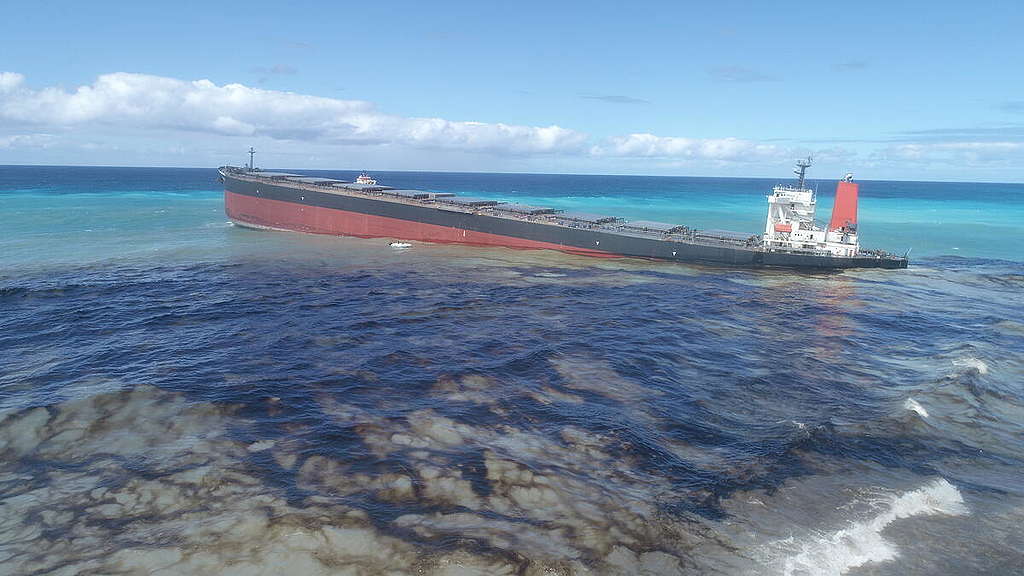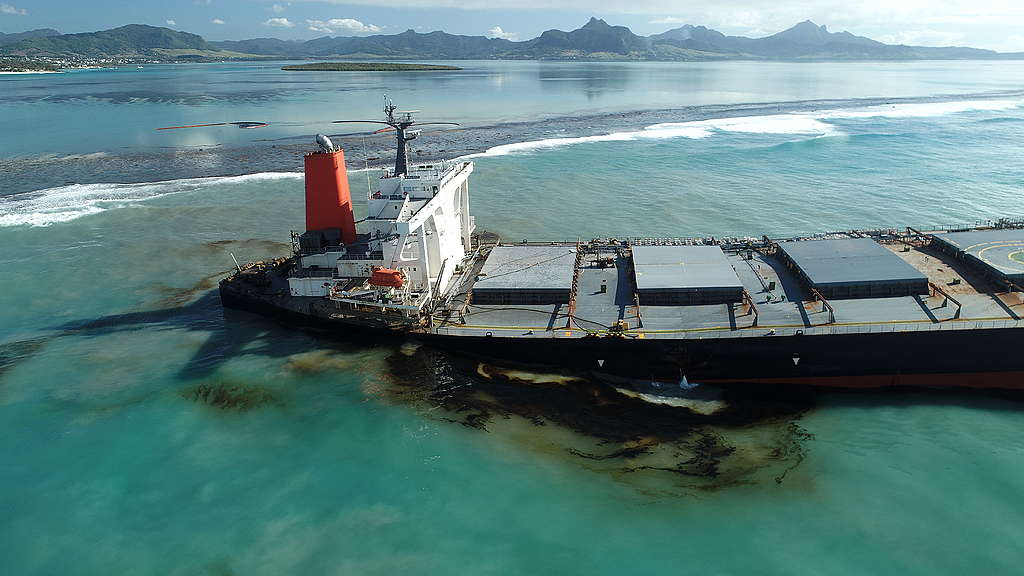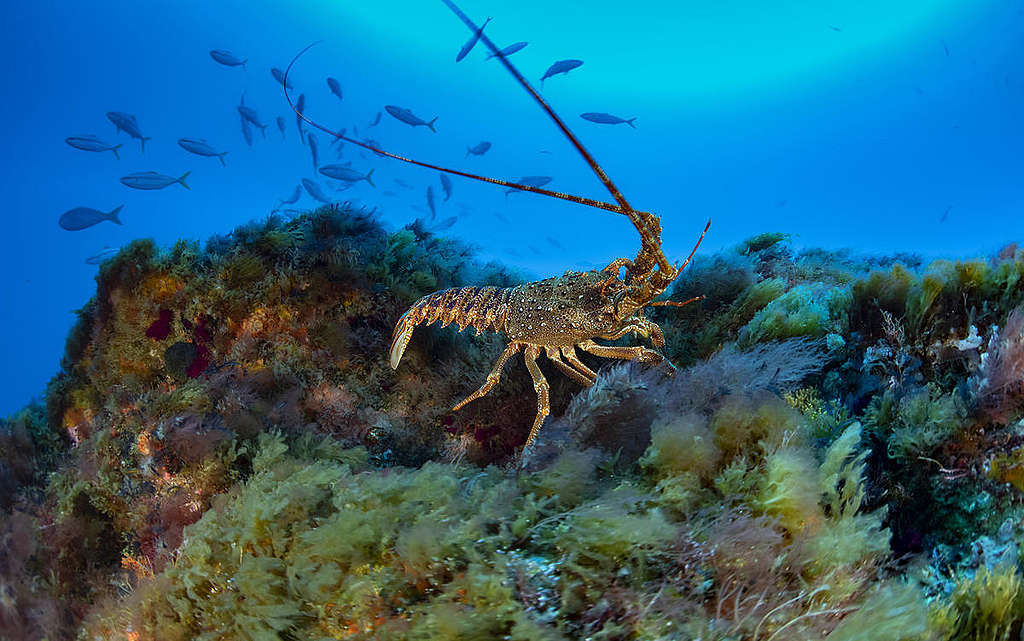
Mauritius, a small island in the Indian Ocean, located off the eastern coast of Africa and physiographically, it is part of the Mascarene Islands. The island of Mauritius is volcanic in origin and is almost entirely surrounded by coral reefs. Our beautiful island is known for its gorgeous turquoise blue sea with silky sand beaches, beautiful mountains, waterfalls, rainforests, and even the wildlife.
Unfortunately, things are getting worse after the Wakashio… The Wakashio, a Japanese-owned but Panama-flagged bulk carrier, held 200 tons of diesel and 3,800 tons of fuel oil — 1,000 of which leaked into the sea. Nagashiki Shipping, the company that owns the vessel, said that over 460 tons had been manually recovered. But according to satellite imagery, the oil spill covered an area of over 10 square miles this week (latest satellite analysis talks of even larger areas), growing by more than eight times since the ship began to leak. Satellite evidence suggests that there had been a clear direct collision course with Mauritius for several days before it grounded the reefs at Pointe D’Esny with ocean cruising speed maintained – an area of international ecological importance.
It’s home to stunning marine ecosystems and ecological preserves like Ile aux Aigrettes, a tiny coral island filled with endemic birds, plants and animals. Beyond fishing and tourism, reefs protect coastlines from storm surges, cyclones and extreme weather – vital as global heating drives a rise in sea levels and an increased incidence of extreme weather.
Some beaches in Mauritius have shrunk by as much as 20 metres over the last few decades, due to higher sea levels and weakened coral ecosystems. As global heating hastens, so will the erosion and loss of coastline, which will claim more and more coastal communities and threaten to inundate coastal freshwater tables.

Spills like this harm marine life because the chemicals that make up oil are toxic to plants and animals, including mangrove forests and the corals that build reefs. Global shipping industry should step up to its responsibilities globally to avoid such accidents and become climate-neutral as soon as possible and offer support to the people of Mauritius to reduce the pollution, its impacts and ensure the long-term monitoring and rehabilitation of the entire site. You can never “clean up” an oil disaster.
Now we are faced with a catastrophe for coralife for decades to come, as well as the communities that rely on them. For those who grew up in love with the ocean, seeing it as a source of sustenance and life, having to see it as an existential threat represents a truly deep and profound loss. Cultures and communities built on their relationships with the ocean are being disrupted and displaced. For me the images are gut-wrenching and the lagoon where this massive spill is happening is where many of my family lives.
Mauritius is one of the most beautiful places on Earth – I know – and it is being devastated by humans. It’s very difficult to predict how severe the impacts will be in Mauritius and how quickly or well the environment – our mangroves and coral reefs – might recover. There are just too many variables, including the complexity of the ecosystems, what mix of oil has been spilled, and how “clean up” is attempted, which can have big negative environmental impacts. This could have been avoided…
After the oil spill, the usual sights of families strolling by the sea were quickly replaced by volunteers working hard in a grassroots effort to protect their coast.
After the oil spill, the usual sights of families strolling by the sea were quickly replaced by volunteers working hard in a grassroots effort to protect their coast. Packing straw from the fields of tall swaying sugar cane into homemade floating booms, cutting hairs, self-organised groups of local people and activists deployed these along kilometres of coast with visibly evident success, halting expansion of the slick and soaking up oil. All islanders have joined together in an effort to contain an estimated 1,000 tons of fuel oil that leaked into the waters surrounding the picturesque nation off Africa’s eastern coast.

The Mauritian government has told volunteers to stop and leave any efforts to officials but people and local organisations are carrying on their making and deploying booms. It seems better to risk a fine or arrest than to stop, and local sentiment seems to be unanimously negative about the government’s slow response or lack of action avoiding (for 12 days between grounding and leaking oil!) and targeting the slick.
The solidarity of Mauritians has been overwhelming!
Much of humanity is now facing a malignant eco pathological process, deforestation, pollution, draining of wetlands, climate change, globalisation and other factors of modern life are wiping out species and damaging ecosystems at unprecedented rates. The human species, through the instrument of culture, has become the dominant force of planetary ecological change. (the negligence and inattention of the authorities caused all this)
The bad news is clear as an oil spill: we have done a great deal of harm to the planet. But the good news is that we can think, we can choose to act and be part of the solution.
Poor Mother Earth – our mission is Mother Earth not radical inhabitants and to be mindful that every breath we take depends on another life, another species…
Writer origin: Hans Gunnoo is Mauritian. Creative, visionary, motivated, ethical, friendly, hardworking, mature, trustworthy and humble. I love animals and the environment… Will give my life for my pets. And love my family and my little paradise – Mauritius.
 Get Involved
Get Involved
